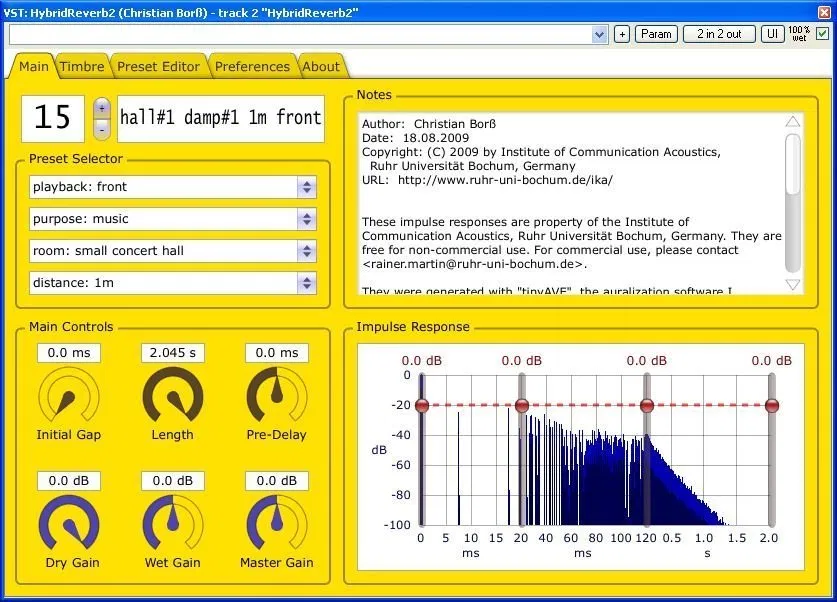
HybridReverb2
“Introduction:
HybridReverb2 is a convolution-based reverberation effect which combines the superior sound quality of a convolution reverb with the tuning capability of a feedback delay network. The sound quality of a convolution reverb depends on the quality of the used room impulse responses. HybridReverb2 comes with a set of room impulse responses which were synthesized with tinyAVE, an auralization software which was developed at the Institute of Communication Acoustics, Ruhr-Universität Bochum (Borß and Martin, 2009; Borß, 2009a). These room impulse responses are designed for a speaker setup with two front and two rear speakers (Borß, 2009b). For a full surround sound effect, you will need two plugins, one plugin which uses a “front” preset for the front channels and a second plugin which uses the corresponding “rear” preset for the rear channels.
Enjoy,
Christian Borß (eMail: [email protected])
Features:
- free and open source plugin (GPL)
- high quality room impulse responses (PCM, 48kHz, 24bit)
- rear channel impulse responses for a natural spatial envelopment
- low latency (down to 64 samples)
- low CPU load
- individual performance optimizer
- intuitive and clearly arranged user interface
- quick selection of presets via categories
- tuning of room impulse responses:
- initial gap / length / pre-delay
- dry / wet / master gain
- envelope (with increasing resolution for fine tuning the early reflections)
- timbre (equalizer with 1/3 octave resolution)
- editor for the preset database
- user specified impulse responses can also be used
In order to compile HybridReverb on a Windows machine, you will need:
- Visual C++ 2008 Express Edition from Microsoft
- VST Audio Plug-Ins SDK 2.4 Revision 1 from Steinberg
- FFTW 3.2.1
Linux developers will need this patch for the VST-SDK to compile VST software using GCC.
This archive contains the source code for the convolution library libHybridConv (included in “HybridReverb2-2.0.2_20091104.tgz”) which is available under the GNU Library General Public License (LGPL). The included Makefile can be used to compile it under GNU/Linux. The file hcTest.c implements a benchmark which measures the processing performance for various segment lengths. The functions hcBenchmarkDual(sflen, lflen) and hcBenchmarkTripple(sflen, mflen, lflen) in libHybridConv.c serve as example for a segmented convolution with two or, respectively, three segment lengths.
